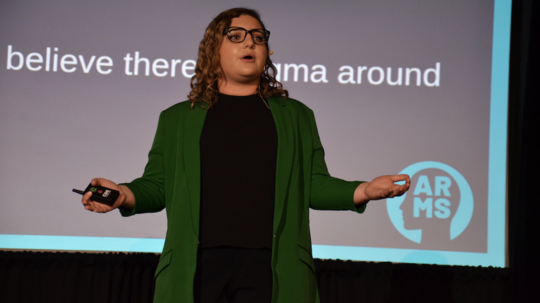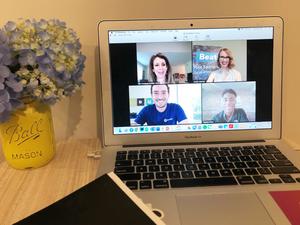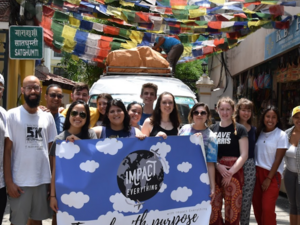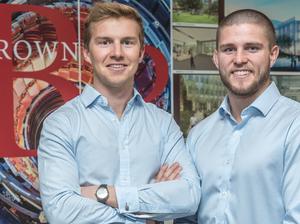
The Brown University Nelson Center for Entrepreneurship held its flagship Breakthrough Lab Venture Showcase last month, displaying 14 of its brightest student-led startups to the public.
The showcase is an intensive 8-week accelerator program that supports student entrepreneurs developing high-impact ventures. It does this by providing students access to high-level sector-specific mentoring, business and technical support, focused programming and dedicated coworking space. In its five years of existence, the program has impacted more than 60 student ventures across all sectors and more than 150 students from all over the university.
“This is our annual celebration of these students who have worked so hard on their ventures,” Jason Harry, director of the Breakthrough Lab, told the audience at the event. “Events like this and programs like this don’t just happen. They happen only at the hard work of innovative educators and hardworking folks here at Brown.”
Rhode Island Inno profiled the rest of the presenting companies in this year’s cohort below. To read part one, check out this piece here.
ARMS - Art To Reduce Mental Health Stigma
When Bella Roberts entered her freshman year at Brown University, she lost one of her best childhood friends to suicide — and it wasn't the last. But even with all of the tragedy, no one in her community was willing to speak about mental health and suicide out in the open.
Her nonprofit ARMS, Art To Reduce Mental Health Stigma, is on a mission to end the hesitancy surrounding mental health discussion by using art as a powerful tool — one that bridges the understanding between people with lived experience with mental illness and neurotypical community members.
ARMS enables artists to hold events that allow them to share their art and stories. Artists log into the ARMS app where they get connected to all the resources needed to hold mental health art workshops, from the venues to manuals with information on how to hold the events.
Every ARMS event has three parts: A performance by the artist themselves, a workshop and discussion where attendees get trained on how to use art to start conversations around mental health and a sharing session of the artist’s work and stories through open microphone. In two years, the company has held over 20 events, has 18 partnerships with local businesses and artists and 40 dedicated volunteers. The company is a fully sustainable social enterprise that makes money through donations and commissions on tickets to the events and merchandise sold at the events. The company is currently raising $75,000 to expand to New York and Los Angeles, provide financial assistance to attendees that can’t afford event tickets and pay its staff.
BASA
In 15 years, it is predicted that 70% of jobs will require some basic knowledge of STEAM, which stands for science, technology, engineering, art and mathematics. In contrast, only 17% of students feel confidence in STEAM.
BASA is looking to bridge this gap with its community platform that provides STEAM learning to children ages 8 to 14. Schools typically have difficulty with STEAM curriculums because they are hard to create, and even more difficulty teaching it. It doesn't help that the complementing materials for enrichment are expensive. BASA’s platform creates STEAM curriculums tailored to specific subjects, provides an experience instructor from the local community — and the materials as well.
Courses include subjects like sustainability and building flying machines. The company is looking to launch a pilot program in Providence, as well as school and community partners, funding, web developers and advisers.
Embonet
Every year, there are approximately 500,000 open heart surgeries in the U.S., but not all end well. These procedures often can lead to brain damage, with up to 6% of post-operative patients suffering from a debilitating stroke, and nearly half of them suffering from cognitive decline.
The strokes can occur when the tube from the cardiopulmonary machine is inserted into the patient’s aorta, which then can dislodge embolic debris that has the potential to reach the brain and cause a stroke. Medical device companies know about the problem and are currently trying to solve it. However, there is still a long way to go.
Embonet is a class 2 medical device company that uses a double-layered pocketed mesh deployed at the beginning of surgery. It is designed to allow regulated blood flow to go through while capturing debris before it reaches the brain.
The company has already done some proof of concept with preliminary testing of its device. It's also developed a partnership with the Secant Group, which they believe has the expertise and consulting necessary to make their medical grade meshes, create a more optimized mesh and improve performance with more studies.
Embonet has completed product development and the randomized control process, and is now preparing for clinical trials. The idea is to sell the product to hospitals, who will want them to produce higher patient outcomes and lower costs. Insurance companies will hopefully be interested in covering some of the cost of Embonet meshes, because the cost of a postoperative stroke is $30,000.
Embonet projects their share of the market (that could be worth $1.3 billion by 2025) to be $100 million. Eventually, the company plans to exit by licensing its product to a medical device company with the manufacturing power to scale it internationally and change the overall standard of open heart surgery.
Intus Care
The passing of the Federal Cures Act mandates that every home health care organization have some sort of electronic visit verification showing that care providers entered and left a patient’s home (as well as a record of the services they provided) by 2020.
Antiquated methods by home health care organizations are already resulting in $10 billion lost annually, due to improper medicare and medicaid payments. Intus Care will look to solve this issue by using technology, such as automated processing and machine learning, to improve the in-home care model and increase efficiency.
The company has a two step verification process, where care providers scan a QR code upon arrival and departure that pings their GPS location, creates a time stamp, offers performance tracking metrics and real-time updates for the patient’s families.
There are 12,460 home health care organizations that need some kind of electronic visit solution in place by 2020. However, Intus care is targeting the 8,700 of these organizations using archaic tools to record verification such as pen and paper. The company will charge $8 per patient per month.
It plans to work with home health care organizations, PACE programs, assisted living facilities, nursing homes and private insurance companies. In January of 2020, the company plans to launch a pilot with 1,300 patients through two organizations that it will scale up as the year progresses. Intus Care has also been approached by Microsoft to join its startup accelerator, participated in MassChallenge and competed in other pitch competitions.
La Pate
When Ian Chiquier and Lucas Fried first launched their own crepe stand, they found success, selling crepes on 20 different occasions and taking home a profit every time. But they also realized just how much goes into launching a food startup like a stand.
It required getting through federal, state and local regulations and a few thousand dollars of investments — and that was before even knowing if the idea would work.
Now, the two are looking to give food entrepreneurs a way to test their ideas before making that investment. Their company, La Pate, would provide resources such as a commercial kitchen, licensed cart, food safety manager and other equipment needed to test out food startup concepts before making that big initial investment.
Lila
Americans are trending healthier. 60% of consumers say it’s important that food is sustainably produced, while 77% of consumers are limiting added sugars and 80 percent of consumers say they want to eat better.
The company Lila is building on these emerging trends by bringing the Chinese superfood black goji berries to the American market.
A crash course on the goji berry: They're chock full of antioxidants such as vitamin A, B and E. They are used in Chinese medicine to treat high blood pressure and heart disease, as well as promote healthy skin and support the immune system. Additionally, they can be used in a number of different food purposes and be put into various alcoholic beverages.
Lila has been selling dried goji berries in reusable containers. They are working on building an Instagram presence and approached $1,000 in monthly revenue in July. The company is also in the process of finalizing its first retail contract, which will allow it to triple sales. Their goal is to be in 50 retail stores by next year, and then eventually approach large grocery stores like Whole Foods and Trader Joes.
Mobile Med
Despite all of the technology in today’s world, emergency management services are still in the Stone Age when it comes to innovation.
If an EMS worker on the way to the hospital with a critical patient wanted to get in touch with a doctor, they would have to pick up a company-issued flip phone, call the hospital and pray a doctor was nearby. Additionally, when EMS workers file reports after delivering a patient, they are forced to type them up and then print them out and deliver them in person or fax them in.
Mobile Med would solve these issues with a two-way, voice-detect enabled communication system between ambulances and hospitals. Providers on the ambulance could submit initial information on the patient to the hospital, and providers at the hospital could use text to respond. The data would then be retained and stored into the patient’s records.
Down the road, the company wants to be intelligent and use data to perform analytics, ultimately flagging patients who have certain vital signs or that have certain electrocardiogram signals to tell hospitals that a patient is a priority. This move would save hospitals funds, as they currently waste lots of money on false activations.
Mobile Med plans to charge hospitals at least $5,000 a month for its services. There are 5,000 english-speaking emergency room hospitals in the U.S., and the company will eventually expand internationally. Mobile Med has developed a functional text-based system and is looking to partner or license from a company that specializes in medical-narrative recording, so it can implement the voice detection aspect of its vision.








